#i tell him about medical dissection in the 12th century and he tells me about pirates. then my mom talks about accounting and the farm and
Note

He successfully defeated the neverseen with the power of his new harness and now he is tired
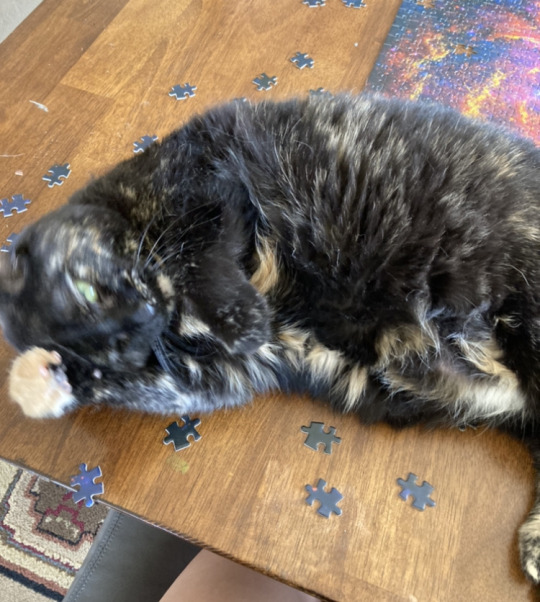
[ID: A slightly blurry photo of a black and brownish cat rubbing her head while splayed out on a table. She’s laying on top of a space puzzle and displacing several pieces, some nearly pushed off the table. She’s very clearly in the way. /End ID]
i am so so proud of your dog for successfully defeating the Neverseen! And I return for the pet picture I am sharing one of my own from when Sammie decided I should stop puzzling (this puzzle is of the central area of the Milky Way) and pay attention to only her.
your pet seems much more productive than mine
#quil's queries#solreefs#pet photos#quil’s unholy underworld#if you were wondering yes space puzzles are difficult#doesn’t stop us from having a lagoon nebula and Milky Way one#there’s this third one we were gonna get but haven’t yet#but probably will#because my family loves puzzles and space is cool#currently have a pirate puzzle rn tho#because my dad is a huge pirate person and always passing on knowledge#does /your/ dad tell you random facts about Anne bonny and the port royal earthquake on its anniversary (June 7th 1692)?#because mine does#very fun :)#i tell him about medical dissection in the 12th century and he tells me about pirates. then my mom talks about accounting and the farm and#my sister talks about anime#we are So Normal
5 notes
·
View notes
Text
The Strange Case and Origin of Dr. Edgar Griffith Swansea
“For we learn to do certain things before we know what we are doing and in ways that no one can adequately explain. In twenty-four months, an infant learns to recognize and discriminate the elements of the world around it, learns to pull itself erect and walk, learns to hear language and to talk. Is it possible that we accomplish these feats better for our lack of knowledge about how we do them? Can we know anything unwittingly? ...Will knowledge solve our problems? Will an ‘explosion’ of knowledge reduce hardship among us and make us just, virtuous, and free?” — Forbidden Knowledge: From Prometheus to Pornography: FOREWARD
Vampyr has a rather unique method of sharing the narrative of its characters a, in that we only learn the truth of who they are and what they are throughout all their lives only when you choose to Embrace them and witness their final moments. It is Gothic, melancholic, morbid, sinister, grotesque—like a foretelling omen. While Vampyr and DONTNOD have taken inspiration from many eras and many works, there were always certain characters within the game that I wondered much more curiously about than others. Edgar has been one of them; boggling in my head since the game’s release long back in June, and I just found myself researching into this bizarre, yet bubbly and warm man. I have much to share, and a lot I’ve found, but for now, I just wanted to share and analyze interesting details I have found about just where exactly Edgar came from, and how on Earth he landed himself in the so-called “vertiginous” world between life and death as the Administrator of Pembroke. As usual, feel free to PM/message me if you wish to discuss any of the work I post! I’d love to hear other people’s thoughts.
This essay is going to spoil everything and anything about Vampyr, so be warned! It will also spoil any other references I may mention in the process, but as always, those shall be marked!
@orionali, this essay was inspired by your dedication to Swansea as a character! I would also like to thank you for assisting me with this essay, as without your help and resources, I would have had a lot more trouble analyzing this essay.
I would also like to thank @terioncalling for their extensive resources and archiving of lore collectibles; its been a great help in assisting me with this essay and many of my other upcoming projects!
We cannot analyze Edgar without first attempting to dissect and review what we do know about who he is, where he came from, and how he even found himself as the Administrator of Pembroke in the first place. This essay will entirely be dedicated to analyzing the information we have about him from the game and connecting it to outside sources and time periods that occurred during the 20th century. This essay will also take the time to analyze some of the information garnered from these sources and will attempt to dissect exactly what they mean and why they were chosen as they were as a sort of biographical account of his origins.
To start off, we have Edgar’s entire biography to us if you choose to Embrace him during His pillar choice:
Full screenshot
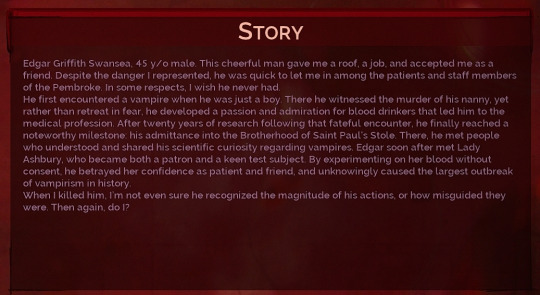
Alongside his personal history, we also have some hints as to what he did prior to his administration signing at Pembroke in 1911, which reveals that Ashbury had offered him the position in 1909.
Full screenshot
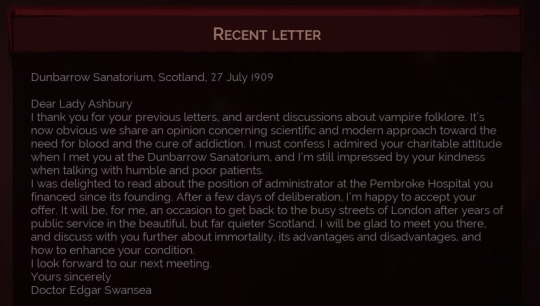
Here are Edgar’s personal accounts regarding his past and present when speaking to Jonathan, revealing that he has been engaging in experiments with haematology as well as vampiric blood, presumably.




Even prior to this, we know that Pembroke’s earliest record is on April 6th, 1872, just a year before Edgar’s birth as we can spot a photograph of Pembroke from that time.
Full screenshot
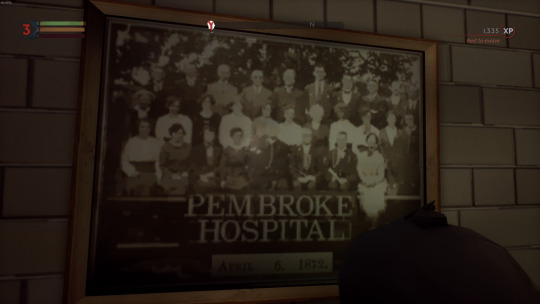
We also know where he may have received his medical education from, as a photo of the Royal College of Physicians is also hanging in his office:
Full screenshot

Along with that, he shares an old friendship with at least one of the staff members, Dr. Corcoran Tippets, and one could even say the current night staff at Pembroke were all hired by Edgar!
Full screenshot
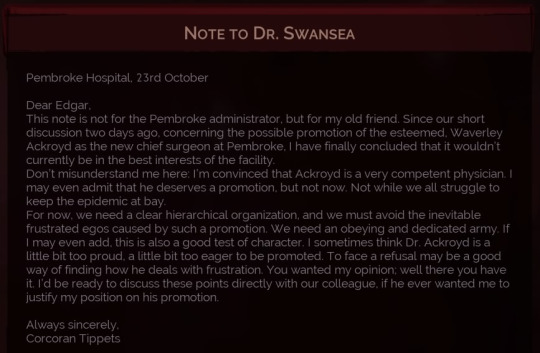
Armed with this knowledge, we can now begin to dissect him one by one, starting with his name and attempting to establish his place of origin. We are first told that he is 45 at the time of his death (Embrace), which means that Edgar was born in 1873 in the heart of the Victorian Era (1918 - 45 = 1873). We also receive his full name—Edgar Griffith Swansea, which is a curious choice of middle name as well as surname. The fact that he even has a middle name is also an interesting choice, as middle names were often only reserved for those in the elite ((the longer one’s name was, the more classically elite you were—take the ancient usage of the “praenomen, nomen, cognomen” system of the Romans, where a name was meant to indicate your branch or family tree; take Q. Pompeius Senecio Sosius Priscus’ full name, which boasted a total of thirty-eight (pg 303). Jonathan and Ashbury also share a similar phenomenon which is telling of the lineages they presumably stemmed from; especially for Ashbury, as women only held two names unless they hailed from a royal or extremely wealthy family)). The practice remained in the 20th and 19th century but was still rather rare as the custom itself decreased over time in Rome through the centuries, leaving the practice obscure and lost. The Italians brought back the tradition in the 13th and 14th centuries, either deciding between a common name or utilizing the name of saints so that their children may be protected by said saint.“Griffith” is a Welsh surname. Pronounced “ɡɹɪfɪθ”, it’s origins come from Wales, stemming the Anglicized version of Middle Welsh word name known as “Gruffudd”, which is also derivative of the Middle Welsh word “Gripiud”. The word only proceeds to find itself in older and older origins; to the Proto-Brythonic word “Grifjʉð”, which came from a language even further back to the Latin and Celtic words; “grȳphus” (griffin) and “jʉð” (judge), with “jʉð” stemming from the Proto-Celtic word “yowdos”, which stands for “lord” or “judge”. This makes sense, as when you define the closest word to “Griffith”, it references an interesting trend:
N. A male given name, borne by ancient kings of Wales.
A patronymic surname.
“Patronymic” means a name that stems back from an older male ancestor, most often a father or some sort of King. This implicates that the name itself was only reserved for those in power. The “ancient king” in question was that of King Gruffydd ap Llywelyn, who ruled from c. 1039 to 1063. You can also consider some similarities with the “Griffin”, or “Gryphon” creature, as both words hold the same Latin origin as “Griffith” (grȳphus), but do note that they are not mutually exclusives. As for his surname, it also holds Welsh origins and is actually an entire region within Southern Wales. It was not named an official city until the year 1969, but a town charter had been established in Europe’s Middle Ages from 1158 - 1194. The etymological origins of the word are a mixture of Old Norse of the words “sveinn”, meaning “boy” or “servant” and “ey” meaning “island”. “Swansea” itself also held various variations from the 12th to 14th century, from “Sweynesse” in c. 1165, “Sueinesea” in 1190, and “Swanesey” in 1322. Digging deeper into the etymology leads us with further implications to servitude; “sveinn” holds roots in the Proto-Germanic word “swaniez”, goes further back into the Proto-Indo-European word “swé”—both of which connote to the definitions of:
N. *swainaz m. (masculine) relative;
kinsman; young man
herder; herdsman
“Swé” itself means to “separate; apart; one’s self; one’s own”, which is quite peculiar given how the words it would come to shape would mean that of servitude and obedience. Of course, being a Welsh city it also has a Welsh name, which is known as “Abertawe” a combination of the two words “aber”, lit. “estuary, mouth”, and “tawe”, a river that borders Swansea, but also has an obsolete definition which also proves to be curious:
Adj. to “taw out” or to “tawe out”;
lit. “take out” through means of extorting.
Combined, it grants us the literal definition of “the mouth of Tawe”, hence “Abertawe”, which was first mentioned in a Welsh document Aper Tyui around c. 1150, as well as various other texts mentioning the phrase. But what of his forename, of our duly noted “Edgar” himself? “Edgar” hails from the Old English word “Ēadgār”, an amalgamation of the words “ēad” meaning “happiness, prosperity” and “gad”, meaning “spear”. “Ēad” is specifically used in a poetic context and definition, for instance:
N.
(poetic) happiness, prosperity
Geþyld byþ middes eades.
“Patience is half of happiness.”
Much like “Griffith”, it, too, is a patronymic name as well as a given male name. “Ēadgār” was also the name of several kings from the Old English era, such as Ēadgār the Peaceful (or Edgar the I, or Edgar of England) who reigned from 959 to 975 and as his title would suggest, was most revered and known for his reign of peace; so much so, that his name has been connotative to “happy spear”, the “Ead” itself referencing several objects and symbols behind “happiness”, as shared in “The Old Norse contributions to the development of the English lexis – a study based upon Proto-Germanic”, which analyzes how the Old Norse language developed the current English and Welsh languages:
“It managed, however, to leave its trace in a few Anglo-Saxon names – some of them still common in modern times: Ēadgār ‘happy spear’, Ēadmund ‘happy protection’, Ēadred ‘happy counsel’, or Ēadweard ‘happy guardian’.” (pg. 45)
This assertion of incessant happiness being tied to his name is quite fitting for the bubbly, albeit eccentric and peculiar, persona that Edgar presents us with. Until his untimely end or his very much grateful Turning, of course. But what of the “spear” portion of his name? Edgar definitely does not strike as a man who would go out in battle; he is on the direct opposite side of such things, and we know this simply due to the faction he had chosen to chase for twenty years, that being, the scholarly Brotherhood of St. Paul’s Stole vs the fanatical hunters of the Guard of Priwen. Edgar also tells us directly that he has been a member of the Stole for at least “several years”.


Yet, as Usher confirms when Jonathan questions him about the origins and the making of the Stole itself, both Priwen and the Stole were one and the same—he also implies that one would be most naïve to assume that the Stole were simply a group of neutral, pacifist scholars as well, long before or after the schism of 1801.


Usher, however, writes a rather different account in the lore collectible known as the “Origin of the Brotherhood”, an excerpt from his “Whispers of our past” documents:
Full screenshot
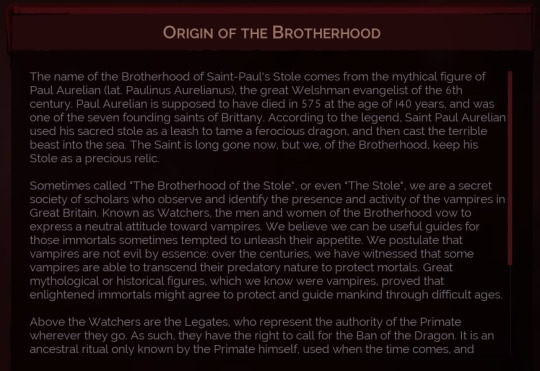
Full screenshot
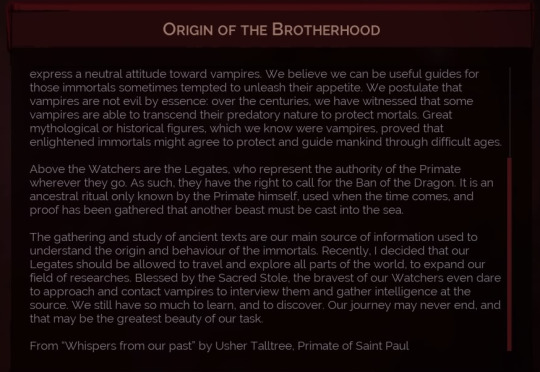
Much of the Brotherhood and Priwen have various allusions to Arthurian legends—from their titles (Priwen being King Arthur’s shield), to the sword that McCullum brings to battle both in Jonathan’s fight and his appearance in Whitechapel cemetery (Excalibur, or Caliburn, was said to be a greatsword of incredible power. The Dragonbane has a similar shape to the said sword, though they are not the exact same models within the game; it was the sword of Pawl, the founder of the original Brotherhood and later on during the Schism, St. Paul’s Stole. The Arthurian legends specific to Vampyr are from the works of Gruffudd ap Arthur (who is more well known as Geoffrey of Monmouth), with his epic chronicle known as “De gestis Britonum or Historia regum Britanniae”, or “The History of the Kings of Great Britain”, from c. 1136)). This is another intriguing thing that will be further analyzed in this section as, while it may have simply been for mechanical game reasons—Edgar has both a copy of the Dragonbane and Carl Eldritch’s original gun—Barker; symbolic weapons to both sides of the Original Brotherhood.
On the assumption that both of these things were not purely stashed into Jonathan’s room for convenience (i.e: said game mechanic purposes), what could this potentially mean in terms of Edgar’s entire, and true connection, that he holds with the Brotherhood? I question this as we first get glimpses of a possible connection between him and Priwen. As you head on to the second arc of the entire game, you eventually run into Geoffrey McCullum and Edgar arguing in his office. Before you enter the room, however, you can overhear several lines between the two of them. Here is all of them (thank you to @zenkhartha for compiling these):

All of these are rather interesting, but the line “You’ve grown soft!” to me, seems to augur that Edgar was not once previously the giddy, neutral scholar that the Brotherhood is suggested to be members with, which would also correlate to Usher’s statement. It also correlates to the idea that the Brotherhood keeps their true, hidden behaviour under more wraps than people may believe. Take Redgrave’s note for the Ascalon Club, warning his members to not be labelled as a “Dragon”:
Full screenshot
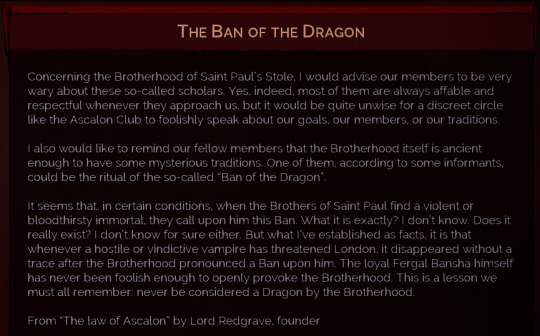
This sort of fear is clearly indicative towards the idea that the Brotherhood, even now, is more than just neutral scholars that seek to understand vampirism on all facets. Adding onto this, why does Geoffrey barge into Edgar’s office anyway? Why does Edgar speaks words that seem to indicate he is quite familiar with the man, or at least has had some prior connection with Priwen, or perhaps just Geoffrey?


When Geoffrey does not yield, Edgar reminds him of the kind of territory Pembroke is in quite the uncannily authoritative manner. A neutral territory between the likes of both the Brotherhood and Priwen.

This suspicion alone becomes even more curious if you choose to have Jonathan Turn both Geoffrey and Edgar. If Pembroke is not hostile, Edgar says some fascinating things regarding his relationship with Geoffrey.
These two following portions remain unchanged, but, Jonathan begins with this:


Prompting Edgar to say this:


Now, if Geoffrey is Turned as I mentioned, Jonathan will be triggered to say this line, bringing up an important aspect to Edgar and Geoffrey’s history:


Edgar simply comments on Geoffrey’s “condition”, questioning his acceptance of it (which is funny, given how Geoffrey seems strangely… fine with his change, but, that is a discussion for another time).


To reel back slightly, here are the two weapons I mentioned that Edgar seems to have stashed in Jonathan’s room. If you purchased the Hunter’s Heirloom DLC, you receive two weapons, both of which have once belonged to a side of the original Brotherhood.
Here is Priwen’s weapon:
Full screenshot

Here is the Brotherhood’s, with a Dragon and True Dragonbane comparison showing no difference (which may be due to the implication that the True Dragonbane has had several copies of it made: “It seems a few copies may have been made…” — Funnily, both of them read with the line “but this is the true and original Dragonbane”):
Full screenshot
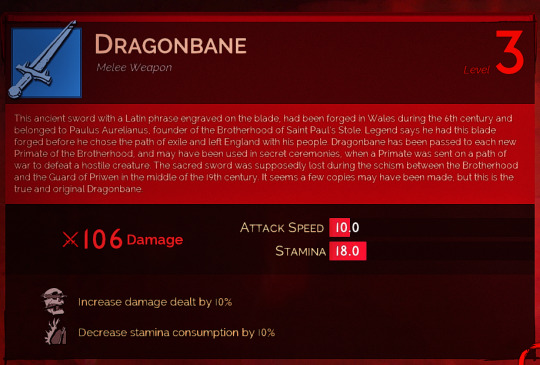
Full screenshot
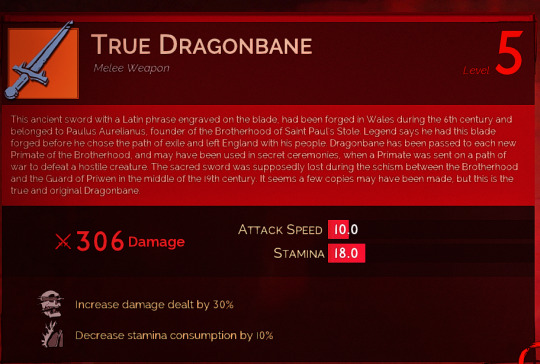
This could implicate a variety of things. Perhaps Edgar knows Geoffrey merely due to the poor relationship between the Stole and Priwen. Maybe Edgar himself had once aligned with Priwen. Perhaps he simply knows McCullum from something else entirely—the curious thing is that no one can really know for sure! However, now that we are armed with the fact he has both weapons, and the fact that the Brotherhood was once merged with Priwen, one must point to the apparent kinds of practices the Brotherhood used to perform. Usher shares quite the sinister insinuation for both the original Brotherhood and perhaps even the current Stole, as we see above.
Usher claims that the Brotherhood is now merely a neutral sector of scholarly individuals simply looking to study vampirism, but to technically define one’s organization as neutral, you must avoid two things—they cannot attack and thus be hostile which is essentially what Priwen are, and, they cannot eagerly fraternize or become friendly with vampire either, which is what Edgar has become, and I believe this eagerness and fraternization both have to do with his personality and his past. There is a specific line that references just how exactly Edgar becomes so enthralled in vampirism—this line can be seen in the second paragraph of his Embrace biography.

“He first encountered a vampire when he was just a boy. There he witnessed the murder of his nanny, yet rather than retreat in fear, he developed a passion and admiration for blood drinkers that led him to the medical profession. After twenty years of research…”
The reaction itself will be analyzed later on in another essay, but I wish to focus on the bolded aspects, i.e: the fact this passion started young, that it stemmed from the murder of his nanny, and that he joined the Stole twenty years after this incident. Edgar, as stated, was born in the Victorian Era—an era brimming with Gothic imagery, aggressive social rules and intense classism. The fact that he had a nanny from a young age and the fact that DONTNOD chose said nanny to be the one closest mention to family suggests one very large thing about his upbringing: that Edgar comes from a relatively wealthy household (the fact he knows what The Ritz is also suggesting that he is at least well-educated, which in these eras, required money to facilitate). The fact he has a middle name, which as stated was only really reserved for the elite, also adds to this suggestion about his family.
To present a bit of background about childcare at this time: the Victorian Era lasted from 1837 - 1901 which means that Edgar would have grown up in said era before the turn of the century even drew itself near. Depending on one’s class, life as a Victorian child was incredibly difficult, even for the wealthy due to strict social regulations for both of the sexes. Many children in high society were more cared for by their servants than their own families—it was a time of nurses, nannies, and governesses taking care of the children; often on a rigid, clockwork structure. Unmarried women took on these roles and ended up becoming more of a mother to these children than the actual mothers themselves, assuring the true mother that her child would be raised on moral and “presentable” beliefs, as well as an ensure a constantly watched eye upon the child.
The Governess; or, the Missing Pencilcase, c. 1875, Barr, Rev. J. T.
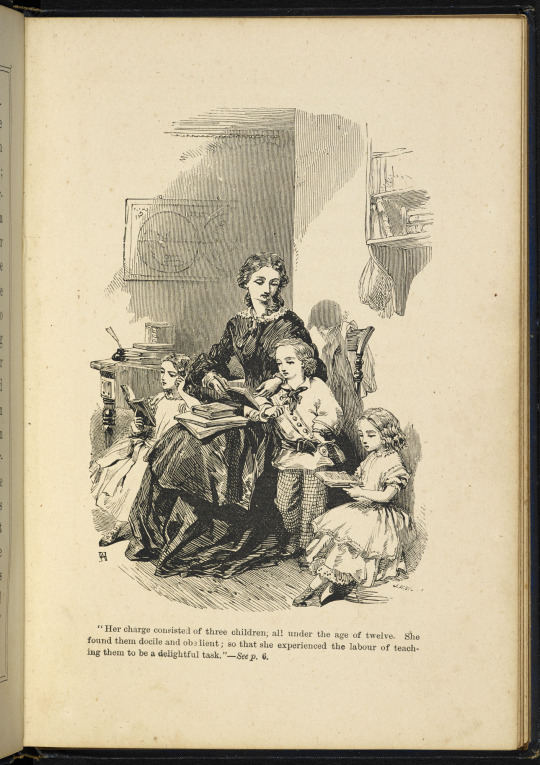
Given how Edgar’s only mentioned caretaker is a nanny, I highly suspect he fell under the watchful care of one for the majority of his childhood. This would explain the peculiarity of one of his hints (the second image is the file name of the datamined hint):


In spite of no biological family being mentioned, that nanny may have been his only motherly figure or even his only consistent caretaker as a child, and thus, someone he would have considered close enough to call family. On the topic of family, is Edgar’s faith. I will simply comment on which faith he would have possibly followed given what we know of his background. I am mentioning his religion given how we have frankly—
Full screenshot

—seen it in action.
Continuing on with the theory that he is from Wales but is at the very least, primarily British because he was born in England—Edgar would have most likely been raised a Protestant, as Protestantism has been the most practised religion (other than Anglicanism) in England since roughly 1532, when Henry VII split England from the Roman Catholic Church and paved the way for Protestantism to enter the country. In Edgar’s case, given his theorized background, Protestantism hit Wales when the Tudor Dynasty took hold of the nation throughout the early 1500s and despite some backlash in the region, Protestants are still one of the largest religious groups in the country, though Christianity is rising in both present-day Wales and England.
All of these hints and theories make Edgar a very vague individual, even if some of these things hold a lot of information for what they present. This elusive storytelling is a key component to Vampyr’s narrative structure, as we know so little of the so-called major cast, from Edgar to even our own playable Jonathan himself!
To roughly summarize the whole of his journey to his current place as Administrator of Pembroke Hospital, here is a rough timeline of what we’ve gathered so far:
BACKSTORY TIMELINE:
April 6, 1872: Pembroke’s earliest record in Vampyr. May have been its opening year.
1873: Edgar is born in the middle of the Victorian Era.
1900s: He becomes a member of BoSPS. He mentions being a member for “several years”, right before meeting Ashbury, so the exact date isn’t clear. He is stated to have gone on a “twenty-year journey” before finally obtaining membership, which means roughly some time between the 1880s (he was stated to see the murder as “a boy”) to the early 1900s.
1909: He meets Ashbury (the letter in her estate dates 27 July meaning they’ve met during winter/spring). Strangely enough, this letter mentions her offering him the job at Pembroke, but...
1911: ...This is the official year he takes the role of Administrator, according to Edgar. This means that it took him roughly two years to become the Administrator, for a reason we are unaware of.
A man of many secrets, years of experimentation underneath his white coat, and strained relations between various organizations, Edgar is the epitome of a mad scientist with a history we are unbeknownst to, with even less knowledge as to he has chosen for this path of vampirism, myopia, and experimentation to lead him thus. To mix the sciences with myth, and to seek out this creature that is both man and beast—both immortal yet mortally there, standing before us. Born out of the heart of the Gothic Revival, or the dark Romantics that flooded both literature, politics, and society—his own childhood starting out cold and in tragedy with a vampiric murder.
Rather fitting for Vampyr’s tale, don’t you think?
Credits, Extra Comments, and Sources
CREDITS:
As stated at the top, I want to give much love to @orionali and @terioncalling for helping me with gathering resources and assets of the game to help with my research. Also, all of Orio’s drawings and pieces about Edgar have helped greatly; her dedication to this warm, bubbly, yet somewhat eccentric fellow is what inspired me to finish this in spite of all my real life issues. ♥
I also wish to thank @cursedbethechoice, they have always inspired me to start this kind of analaytical work and l,ove for the game in the first place, and were very helpful in helping me choose my books and sources. Please be sure to check out their work, as they were one of the first to start the lore dissection of the game.
EXTRA COMMENTS:
University absolutely sucks, as this was going to be a full-on character essay dissecting the mad wonders that is Edgar but alas, I could not finish it with the time I was allotted, as I also have a fever as I type this. However! Expect some miniature essays to come out to celebrate Halloween with to go along with this somewhat larger one! I also still intend to analyze Edgar as a character, and hope to publish his dissection around Christmas (but will try to squeeze in other characters/topics on the side).
However, because of all my constraints, I started on Edgar in late August, and just got the time to write and publish something just before the end of October, welp. This essay is 3,695 words long spans roughly about 20 pages, compared to my Vampyr’s Vampires essay which spanned up to nearly 70 pages and was 14,293 words long.
I miss summer already.
I have 50+ books out solely dedicating to analyzing Edgar and some other aspects of Vampyr as a whole. My library hates me.
If anyone tells you about the “Edgar Wall” I made or “The Walls™” for Edgar—Do not speak of it. It’s still up there and will haunt me until Christmas.
I bothered my English professor to contact his linguistic friends to dissect Edgar’s accent once I realized his name is inhumanely Welsh. I had two English Linguists so far just tell me he is “Vaguely European”. If you see memes about that, now you know why. I’m still salty about this and if any Welsh specialists are out there reading this, please, for the love of God, contact me (I also contacted Vampyr’s Voice Director, but with no luck... yet. I’m this close to bothering Harry Hadden-Paton himself).
Edgar is cute. Ansel proves it.

ALL SOURCES/BIBLIOGRAPHY (in no particular order):
The National Library of Wales’ WELSH HISTORY REVIEW/Cylchgrawn hanes Cymru
“Notes on the Heirs of Commodus” - The American Journal of Philology, Vol. 100, No. 2 (Summer, 1979), pp. 288-306, The Johns Hopkins University Press Edward Champlin
TIME Magazine’s “Now You Know: Why Do We Have Middle Names?”
THE OLD NORSE CONTRIBUTIONS TO THE DEVELOPMENT OF THE ENGLISH LEXIS–A STUDY BASED UPON PROTO-GERMANICKATARZYNA MONTICOLO University of Wrocław, 2016
JSTOR’S Open Academic Resources
The etymology of “Edgar” in Wikitionary
The etymology of “Swansea” in Wikitionary
The etymology of “Griffith” in Wikitionary
Forbidden Knowledge: From Prometheus to Pornography, Roger Shattuck, 1997
Merriam-Webster’s Online Dicitionary
“Raising Children in the Victorian Times“—School Work Helper
Greenleaf, Barbara Kaye. Children Through The Ages. New York: McGraw-Hill, 1978, pp. 78-83.
British Library’s “The figure of the governess”, Kathryn Hughes, 2014
British Library’s video of “The governess” as explained by Kathryn Hughes, 2014
BBC’s Wales’ History: “The Protestant Reformation (part 3)”, 2014
A NOTE ON GRUFFYDD AP LLYWELYN: (1039-63), Walker, David. Welsh History Review = Cylchgrawn Hanes Cymru; Cardiff Vol. 1, Iss. 1, (Jan 1, 1960): 83.
Genuki - UK & Irish Genealolgy: “Place names in Glamorgan“, 5 Sept 2013 - Gareth Hicks
Rensselaer Polytechnic Institute’s (RPI) “Edgar (The Peaceful) King of England��, 25 Jun 2003
“The Liber landavensis, Llyfr Teilo, or, The ancient register of the cathedral church of Llandaff”; from mss. in the libraries of Hengwrt, and of Jesus college, Oxford (Specific Page)
England’s Royal College of Physciains’ Homepage
A BRIEF HISTORY OF SWANSEA, WALES, By Tim Lambert
The Welsh Academy Encyclopaedia of Wales, John Davies Nigel Jenkins Menna Baines, Feb 2008, University of Wales Press
BBC Wales’ “Swansea: The ugly, lovely town that became a city”, Phil Carradice, 03 July 2014
BBC Wales’ History: “The investiture of the Prince of Wales”
Chisholm, Hugh, ed. (1911). "Swansea". Encyclopædia Britannica. 26 (11th ed.). Cambridge University Press. p. 183.
Genuki - UK & Irish Genealolgy’s Swansea Timeline
Geoffrey of Monmouth—HISTORY OF THE KINGS OF BRITAIN, translation by Aaron Thompson, revisions by J.A. Giles, (pg 153), 1999
#vampyr#edgar swansea#vampyr game#essay#dontnod#mine#this is smaller than my last one but alas#university sucks#and i got sick#but!! expect a deeper character analysis and more smaller pieces to be posted throughout this week for halloween#happy trails#HE IS NOT JUST VAGUELY EUROPEAN#I REFUSE TO BELIEVE THAT
43 notes
·
View notes
Text
New on the Shelves: Female Writers
While gender inequality still remains in the publishing world today, the challenges that female writers faced in the past, including society’s attitude towards them, were even more severe and impenetrable. Today the majority of classic writers who have become household names are male, but that’s not to say that women weren’t writing in the early 20th century and earlier – we just don’t know about them! That’s why it has been so exciting that while we have been cataloguing the collection of the legendary Martin Stone we have come across quite a few interesting books by female writers, many of which are new to me. I’d like to share a few of their stories, which I have personally found extremely humbling and inspiring.
ANNA KINGSFORD (1846 – 1888)
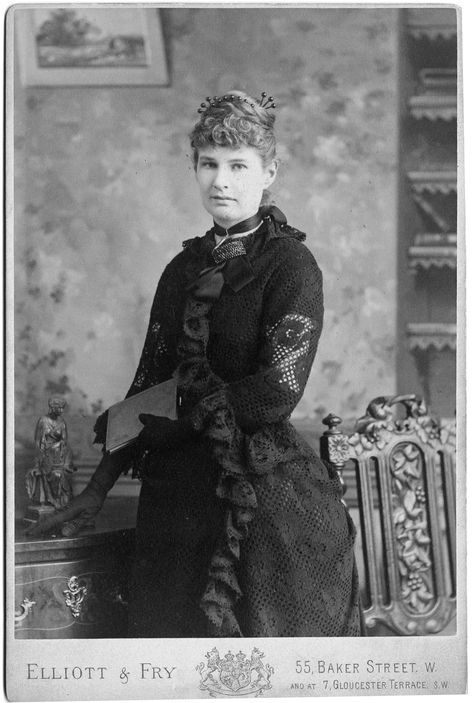
When I picked up a copy of Dreams and Dream Stories, a beautiful little book (black cloth decorated with silver stars and lettering) containing a collection of Anna Kingsford’s dream diaries, musings, poems, and prose, I was immediately fascinated by her writing and by her story. She was a passionate animal rights activist, anti-vivisectionist, vegetarian, spiritualist, and one of the first women to gain a medical degree (as well as being the only medical student at the time to graduate without experimenting on an animal).
Kingsford had a desire to study medicine in order to give herself more authority in her pursuit of the furthering of the animal welfare-based causes that were so close to her heart. British medical schools did not allow women entry, and so in 1874, aged 27, Kingsford began studying medicine in Paris. Although she was allowed to study, it was not easy: Kingsford recounts in a letter to her husband an incident when, in group of around a hundred students (Kingsford being the only woman), a professor refused to speak or even write her name during a roll call, claiming that she was neither a woman nor a man.
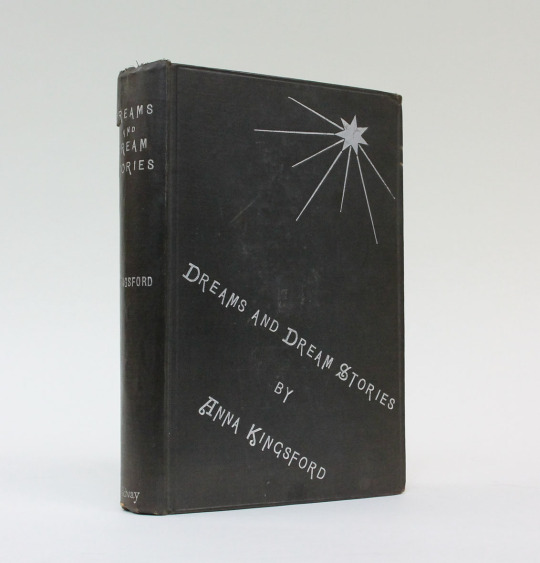
Paris was at the time the epicenter of vivisection-based physiology, and Kingsford had to endure the sights and sounds of live animals being subject to horrific experiments. However, despite the distress this caused her, her refusal to conduct any animal experiments, and her writing her thesis on the medical benefits of vegetarianism (which was initially objected to by multiple professors), she graduated with a Doctorate of Medicine in 1880, going on the give prominent lectures and demonstrations promoting vegetarianism (which was controversial even amongst her fellow anti-vivisectionists) and condemning vivisection, just as she had wished.
What she achieved and withstood in her short lifetime is testament to her incredible strength and determination in the face of a society that was pitted strongly against her beliefs and her sex.
KATHARINE BURDEKIN (1896 – 1963)
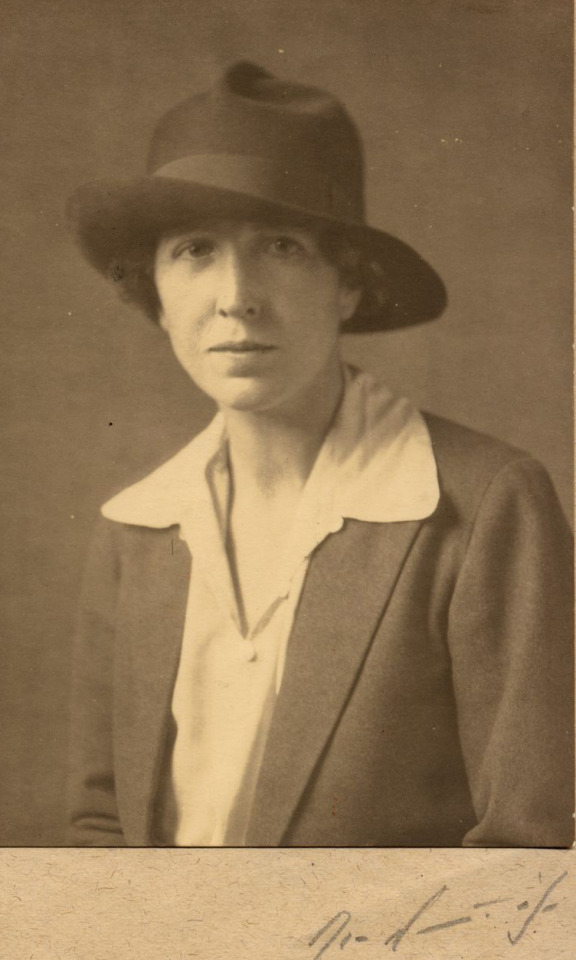
Katharine Burdekin was a truly remarkable writer of speculative fiction with an emphasis on the exploration of incredibly advanced and complex feminist and gender-critical concepts, marking her out as undeniably far ahead of her time. Born into an educated, upper-middle-class family, she was highly intelligent and well-read. She wished to attend Oxford like her brothers, but unfortunately her parents forbade it.
Ten of her novels were published during her lifetime, but fell into obscurity until the 1980s when Daphne Patai, a Professor of Women’s Studies, discovered the true identity of “Murray Constantine”, Burdekin’s pseudonym. Many of her novels were subsequently published by The City University of New York’s Feminist Press and are now of great scholarly interest.
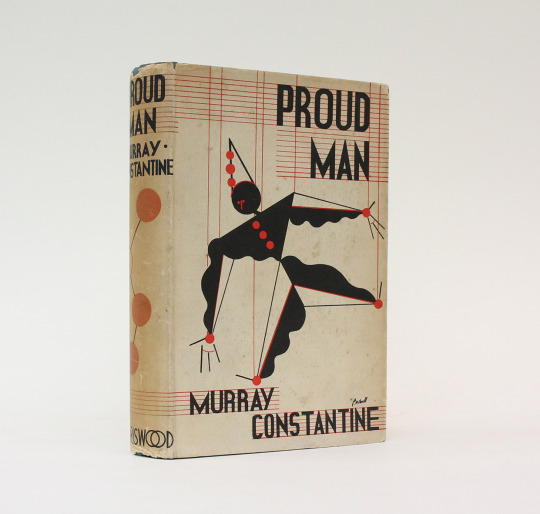
We are lucky enough to have on our shelves two Burdekin first editions. The first, Proud Man, is signed and inscribed by Burdekin. In the novel a completely biologically androgynous human from a peaceful, genderless, vegetarian future society travels back in time to 1930s England, and then gives a critique of this comparatively primitive, “sub-human” society. Through this future human’s eyes, Burdekin dissects our adherence to gender roles and the societal and cultural creation of the masculine identity, theorizing that the male sex assumes that all children are inherently effeminate – that girls naturally become women, while boys must be carefully supervised, taught, and tested into becoming men, and that this is borne out of “a great fear of the suppressed power of the female sex”.
Our second Burdekin, The Rebel Passion, is an early work that the author considered to be her first as a mature writer. It is another time travel-based novel, telling the story of a 12th century male monk who is “born with the soul of a woman” and does not fit into society’s ideas of masculinity. In a series of visions shown to him by a spirit, he witnesses events spanning millions of years from the dawn of life to the creation of a utopian, neo-medieval 21st century society where men and women have achieved complete equality.
CATHERINE CARSWELL (1879 – 1946)

Scottish writer Catherine Carswell’s life was lived among artistic and literary circles, and, having little care for playing things safely or for giving up in the face of adversity, was often dogged by drama and controversy. In 1908 she won a historic court case, making her the first woman to have her marriage annulled by proving the insanity of her husband at the time of their marriage. Some years later she moved from Glasgow to London, where she hoped to further her budding career as a journalist and critic. However, after publishing a glowing review of The Rainbow, a novel by her close friend D.H. Lawrence (who was then a contentious figure at best) she lost her job.
Carswell and Lawrence’s friendship is notable for the affection shown on both sides, and for the fact that Carswell, unlike many of his friends, was never the subject or recipient of the criticism for which Lawrence was known. The pair exchanged a huge quantity of letters and frequently and actively encouraged and advised one another on their writing, with Carswell having particular involvement in Women in Love. The two novels that Carswell wrote during this period were eventually forgotten, much like Burdekin’s, until their eventual rediscovery and publication by the feminist publisher Virago, and she is now considered a crucial figure in 20th century Scottish women’s writing.
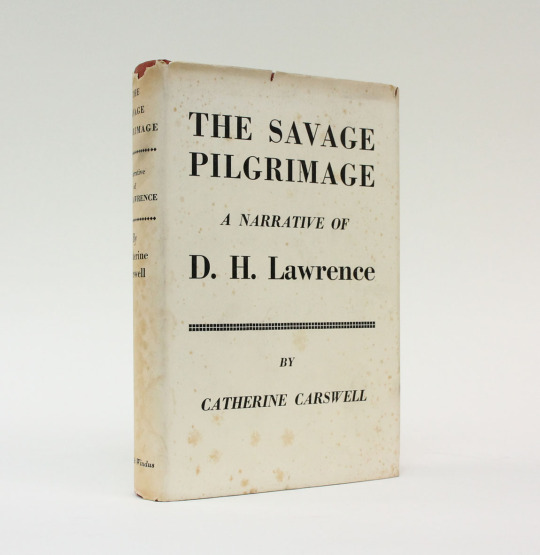
Deciding to turn her hand to biography, Carswell penned an honest yet sympathetic biography of Robert Burns, who had to many become a legendary, untouchable figure. The book was met with uproar, moving one individual to send a bullet to Carswell in the post and advise her to end her life in order to “make the world a cleaner place”.
The Carswell title that we have to offer is a first edition of The Savage Pilgrimage, a fascinating, intimate biography of Lawrence, written soon after his death. It was withdrawn by Chatto and Windus amid fierce accusations of libel from another friend and biographer of Lawrence, John Middleton Murry. Carswell and Murry had developed a strained relationship prior to Lawrence’s death which only intensified in its aftermath, when their biographies conveyed very different ideas about Lawrence’s character and motivations, as well as about each other.
As a final thought, I believe it is worth noting that these women all come from comparatively privileged backgrounds, yet their paths through writing and publication were clearly not easy, not to mention the fact that they were never able to reach the prominence of some of the most acclaimed – overwhelmingly male – writers. It is sobering to imagine how difficult and practically impossible the act and idea of writing would have been for women from less wealthy, more diverse backgrounds – something that we have undoubtedly not yet entirely overcome.
This is only a very small selection of the many amazing lesser-known women writers I’ve recently come across on our shelves, and I am certain there are so many more out there left for me to discover, which is a very exciting thought! I hope you have enjoyed reading about their lives and works as much as I have.
Bibliography
The Scalpel and the Butterfly: The Conflict Between Animal Research and Animal Protection, Deborah Rudacille, University of California Press. (2001)
Proud Man, Katharine Burdekin, Feminist Press at CUNY (1993)
Anna Kingsford: Her Life, Letters, Diary and Work, Edward Maitland Cambridge University Press. (2011)
http://www.humanitarismo.com.br/annakingsford/english/index.htm (2019)
The End of this Day’s Business, Katharine Burdekin, Feminist Press at CUNY. (1989)
Open the Door!, Catherine Carswell, Canongate Books. New Ed edition (2010)
Lying Awake, Catherine Carswell, Canongate Books. 2nd edition (1997)
Published August 11, 2019 by Poppy Connor-Slater .
0 notes
Text
Red Alert (James T. Kirk x Reader)

Previous Chapter
Word Count (2,931)
AN: Can we just take a moment for Chris Pine’s charming smile pls thanks
Commander Grant’s presence turned into several weeks aboard the Enterprise, which then turned into a three month stay. The first few days had left you on edge, but after the first month and a half your nerves seemed to ease. The reminder of that electric tingle and how it almost felt as if he was burning you would occasionally cross your mind, but you just pushed that thought deep down and focused on your job.
One thing you were extremely grateful for was the distraction that both Lance and Leonard offered you. Lance, with his post-shift drinks, and Leonard for always keeping you on your toes. Between patients, reports, and him sending you along for away missions - you barely spent time thinking about that first day. Tonight was no different, as you settled yourself into your very own chair as Doctor McCoy gathered all his belongings up, “Alright well I’ll leave you to it.”
You nodded and started to type away on your desk, the keys lightening up as you went along. Still not hearing him leave, you glanced up, and chuckled lightly, “Top drawer, left side.” You had caught him patting around for his communicator and as you spoke his shook his head and made his way to his desk, “No I swore I-” just as he pulled the drawer open you could hear a sigh, “grabbed it,” he mumbled.
His footsteps sounded through Med Bay as he walked past you once again, and you met his eyes, “I swear sometimes I don’t know what I’d do without you.”
“I wonder the same thing,” you replied just as he was walking out, and smiled to yourself as you eased your chin into your hand. The graveyard shift - something you never looked forward to doing, and regretted it every 12th of the month as it rolled around, just like clock work. You just tapped your pen against the desk and waited it out. Not very often did somebody come in needing medical assistance, but when they did it was mostly fun-loving, sometimes drunk, crew mates who had a minor injury, but it was never anything major.
You sighed and reached into your top drawer and pulled out an ear plug, which was pretty normal on Earth, and stuck one into your ear, and scrolled through a playlist you had created. If there was one thing you were a sucker for it was for 20th century music. There was just something about the tune and the words that reminded you of home. You slowly closed your eyes and let your mind wander.
“The sound of the sick bay doors opening jolted you out of your nap, and you glanced at the clock on your desk. 0300 hours, and someone just walked in. You stood, completely forgetting your ear plug and walked towards the main room. Just as you rounded the corner, you were faced to someone’s back. In a yellow command long sleeve, you were a little thrown off by water dripping down the back of their neck, and how nice their arms fit into the fabric.
Just as the thoughts entered your head, when they turned to look at you you felt your body deflate. Captain Kirk turned to face you, his piercing blue eyes looking down at you, and you registered the small trail of blood falling past his eye, “Oh sir, please, sit,” you motioned to the table and turned to grab a wipe. James pushed himself onto the table and you turned back to face him, walking to his side.
“Thought tonight it was Bones’ turn for the graveyard shift?”
His voice made you glance down at him, and you offered a smile, and slowly wiped the trail of blood off his face, “That would be next Thursday,” you answered and turned to grab a tricorder on the medical cart.
“Well I’m glad it’s you, I wasn’t looking forward to his judgmental looks,” he chuckled.
You turned back around and started to scan your Captain’s cut, not knowing how he was watching you. You looked so at ease about everything, but still Kirk had this off feeling about you. You started to feel the Captain’s curiosity seeping off of him in waves and you finally stepped back, “Well it’s just a minor cut, it should be fine in a few days-”
“Do you think you could check my back as well?”
You raised a brow, closing the tricorder up, “Your.. Back?”
He nodded and stood, “If you don’t mind, of course,”
“I don’t,” you reassured and nodded, motioning to his shirt, “you can take it off.”
You watched what you thought was a smirk start to form over his lips, but as he turned around and grasped the end of his shirt, the streaks of red that were covering his back made you raise a brow. You walked closer to his bare back and lightly with a finger traced a streak of red, mumbling a ‘wow’ under your breath. Your cold finger against his hot skin made him intake a sharp breath, and you noticed, removing your hand, “Sorry.”
“Oh no, it’s fine,” he reassured you, and you walked back to your cart, fumbling through a couple things and prepared a hypospray.
“What happened?” you asked, and Kirk glanced up, not too sure about what you were doing.
“Uh it happened on our last away mission.”
You clipped the hypospray into place and looked back at him in shock, grabbing the anti-inflammatory cream as you walked to face him, “Captain that was two weeks ago.”
“In my defense, I’ve been busy. And please call me-”
Mid sentence you reached up with the hypospray and pressed it into his neck and Jim flenched back, gripping his neck, “God! Fuck! Why’d you-”
“Sorry, Captain, Leonard gave me strict orders for if you came in.”
He rubbed his neck as you moved around, opening the tube of cream and he grumbled, “What else are you doing to me?”
You couldn’t help but smile, putting a good amount into your palm, and reaching around to hand him the tube, “Something I brought with me from Earth. A classic anti-inflammatory cream. Simple aloe vera.” Jim stopped rubbing his neck and grabbed the tube, looking over the medicine he recognized from when he was a kid. You slowly smoothed the cream down his back, causing him to flinch.
“Permission to speak freely?”
The question threw him off, making him glance over his shoulder and you weren’t even looking his way. You focused on slowly rubbing the cooling gel into his back, and he looked forward again, “Of course.”
You were nervous approaching this subject, because anytime Jim Kirk was near you he was suspicious. Of what? You had no idea, or that’s what you told yourself, and you just focused on covering his cuts, “I know for some reason you don’t trust me.. But I’m just trying to help. Really.”
Kirk cleared his throat, finally feeling your hands move away from his back, and you grabbed his shirt, handing it to him as you grabbed a nearby tablet. He watched you, your movements were almost elegant and smooth, like you knew exactly what you were doing. You impressed him, on away missions and for confronting him. How he had given off that untrusting vibe he wasn’t too sure, but he held his shirt in his hands and cleared his throat, making you look up.
“I’m sorry, I didn’t know I made you feel that way.”
You offered a soft smile and shrugged, “It’s fine Captain-”
“Jim. Please, call me Jim.”
You watched him pull his shirt back over his head and he clapped his hands together, “Thank you (Y/N).”
“No problem,” you reassured him, “your back should start healing in a couple days. If you need to come back for some more of that gel just look for me.”
Kirk smiled and headed for the door, “And please don’t tell Bones about this!”
The next night you were off, you found yourself among a large number of your friends, and some strangers (it’s a large ship, you weren’t going to know everyone) in the Lounge. You tapped your fingers against the table when Lance set your drink in front of you and settled into the chair on your side. The nicely browned Bourbon was a sight for sore eyes, and you lifted the drink to your lips.
It just reminded you of Earth.
“So what else happened?” Lance asked you, and you swallowed a small amount of alcohol, your throat burning for a second.
“Just patched him up and sent him on his way. Y’know.. My job?”
Lance laughed, it came from deep within him and it automatically put a smile on your face, and you sipped away at your drink. This feeling right now you would never change for the world, even if your best friend was hinting at something worse than what happened. Your encounter with your Captain, Jim, stuck with you until you could confide in your friend about it. Lance, on the other hand, dissected it to a whole new level and wouldn’t drop it now.
“Oh come on, (Y/N) you know his rep, you know how guys are. We can be dogs! It was late, he knows who’s working when and where. It was not a coincidence.”
You rolled you eyes, pushing some hair behind your ear, “Lance if you don’t drop this subject now-”
“Fuck,” he mumbled, looking down at his drink and your glanced over your shoulder at the door that just slid open. Scotty, McCoy, Spock, and Jim were just entering the Lounge. You didn’t understand Lance’s outburst, or why he suddenly was so interested in his drink, but he was giving off an uncomfortable feel. You turned back to your friend and lowered your voice, “What’s wrong?”
Lance sighed, and shook his head, “I kinda fucked up today near the warp core. Lost my footing, got yelled at by the big man,” he grumbled something incoherent, and you glanced back at the four men who were grabbing some drinks, “never been so humiliated in my life.”
You smiled to yourself and looked back at Lance, “He yelled because he cares, Lance.”
Lance shook his head, and you almost started to laugh. Lance was one of the most confident people you had ever met, so to see him in such dismay was a once in a lifetime occurrence. Out of the corner of your eye you saw Leonard looking your way, and you offered a small wave, and whispered as he made his way over, “Well chin up because they’re coming this way.”
Lance quickly looked up and glared at you, “Sometimes I fucking hate you-”
“No you don’t,” you cut him off and smiled as Leonard was close enough.
“Well if it isn’t my favorite person in the whole world,” Leonard greeted you, and you couldn’t help but laugh at his sentiment.
“You only like me so much because I know where everything is when you need it,” you smiled as he laughed and took another sip of your drink, wanting to sigh when you were almost all out.
“Do you mind if we join y’all?” he asked, and before you could answer, Lance was sitting tall and had his ever-so charming smile on his face.
“Of course not, we’d be happy if you joined us.”
As Leonard sat down next to you, Mr. Spock suddenly seemed more interested in whoever had just come in, and nodded at everyone, Scotty settling into the chair directly opposite of you, “Thank you for your invitation, but I must decline.”
Leonard didn’t have time to object before Spock was gone to another table, and you glanced at Leonard who was cursing under his breath and you wanted to laugh. Scotty was adjusting himself to get comfortable and smiled at your friend, “Ah, McCoy, let me tell you about this one,” he started and you both glanced his way.
“I have never seen someone able to take apart a section of a console, re-wire it correctly, and reassemble it as fast as Lance here,” he clapped his hand on his shoulder, “well besides me of course.”
Everyone started laughing, which gained Jim’s attention to the table. He was holding three drinks in his hands, but had gotten caught up with a cremate trying to start a conversation. He entertained her, but the sight of his friends laughing, and who they were laughing with, made him excuse himself and finally head over.
“Not to blow sunshine up (Y/N)’s ass or anything, but she’s been my favorite head nurse by far. She just seems to know what people need, Hell, even sometimes before I do.”
You smiled, taking another sip of your drink, emptying your cup when finally Jim was setting three drinks down for him and his friends.
“Took you long enough,” Leonard commented, grabbing his beer and taking a large swig of it. Your eyes met Jim’s as he looked around and his smiled at you. You were suddenly very glad you confronted him a few nights ago. He was much more comfortable now. Jim pulled up a chair, sitting beside Scotty and opposite of you and finally noticed something was missing.
“Where’s Spock?”
“Ditched us. Probably saw Uhura,” Leonard answered, setting his drink down. Jim shook his head and mumble before taking a sip of his drink.
“Bastard.”
Soon you were all exchanging stories and almost no one could keep from laughing. For some reason, the conversation turned to your lives on Earth, before Starfleet, and Jim was mid story about his life.
“I was honestly the worst kid, teen, everything. I’m not sure how my mother even put up with me to be honest,”
“I wonder the same thing too,” Leonard commented earning a glare from his friend and just laughed. You smiled, having only just finished your second drink and glanced down at your watch. It was getting late, and you had to be up early in the morning. Jim noticed you looking at the time and motioned your way, “What about you, (Y/N)? What do you miss most about home?”
You pondered his question a bit and finally smiled, “The smell of home.”
Jim raised a brow, “The..smell?”
You nodded, almost laughing at yourself, “The smell of freshly cut grass, for one. Or how it smells after it rains. Even the foods. Replicator food is not the same as watching someone hand make your food and just closing your eyes and taking it all in.”
Everyone seemed to ponder that, and after a few seconds Lance said, “She’s right about the food.”
And so the conversation continued onto foods everyone deeply missed. You noticed Jim had gotten quiet, but you still stood and nodded, :I had a great time, guys. But I have to wake up early.” Leonard started to object but you wouldn’t have it, and waved you goodbye and set off for your quarters. You weren’t even halfway there when a voice called your names, and you looked over your shoulder to see Jim Kirk hurrying after you.
“You left this,” he offered out your communicator and you groaned, rubbing your head.
“Seriously? Thanks for noticing, Jim,” you said and reached out for it, and grabbing it in your hands. Jim smiled and shrugged.
“It’s no problem. I was heading back to my quarters anyway. Mind if I walk with you?”
You shook your head, “Of course not.”
You both started walking side by side, in silence. You weren’t sure what to say. He didn’t know what to say. This scenario was going differently in his head, so he just went with the first thing that came out of his mouth.
“You ready for that away mission next week?”
You looked over at him and then back forward, “I guess so, I haven’t thought much about it yet to be honest.”
Stupid question, Jim he thought to himself, but he nodded either way and looked over at you. Your hair was down for once, not pulled away into a bun or ponytail like normal when he saw you. It flattered your face in the nicest way, and your cheeks were a light pink from the alcohol. You were slowing your steps, and Jim noticed you stopped outside a living quarters. You smiled at him, “This is me.”
He nodded, “I had fun tonight. Thanks for putting up with us.”
You giggled for a second, and shook your head, “I had a lot of fun hearing everyone’s stories. Even if Leonard can’t hold down his drinks.”
Jim laughed, shaking his head, “He was terrible tonight. I won’t let him live it down.”
“I’m sure you won’t,” you replied, and a comfortable silence fell over you both. After a few seconds, you smiled and looked back at your quarters, “Well, thanks for walking back with me. Goodnight.”
You opened the doors and Jim shuffled his weight between his two feet, before calling out, “Thank you, again.. For everything.”
You turned around, making sure the door didn’t close. You looked at him as he waited for you to reply. It threw you off, and you smiled at him.
“You don’t have to thank me, Jim.”
“I wanted to,” he said and you felt your cheeks get a bit hotter. Hopefully, he didn’t notice. But he started walking backwards, and smiled one last time, “Goodnight, (Y/N).”
For the rest of the night you couldn’t sleep. You were suddenly uneasy - but in a good way.
TAG LIST
@digitalmoonhowell @cadetomlinson @superflowergirlxxlove @amandakwoodstock @whenlucasmetmaya @brooke-supernatural16 @kissingwintergoodbye @missthang2734 @random-fandom-lady
#james t kirk#jim kirk#james kirk x reader#james kirk fic#jim kirk x reader#jim kirk fic#leonard mccoy#leonard mccoy x reader#leonard McCoy fic#star trek fic
140 notes
·
View notes
Note
PLS TELL ME ABOUT THE HISTORY OF CADAVERIC DISSECTION I WANNA HEAR ALL OF IT PLS PLS PLS
Yes yes yes!! I would love to!!! I love this subject!! /g
disclaimer: I’m not an expert, I just think the topic is interesting and research it in my spare time
so I think one of the more fascinating aspects of human dissection, is that originally it all started with the goal of finding the soul. These people wanted to figure out where in the body the soul was kept, as the soul was the part of you that would outlast your body and persevere forever. This is a fairly religious outlook, but it’s what motivated them. It’s an outlook that can be seen with the ancient Egyptians, although they were taking apart the body for purposes of preservation, not to study the anatomy. A lot of earlier people actually thought the heart was the most important organ and not the brain, which was why it wasn’t preserved in the mummification process.
But now for actually dissection! We go back to Ancient Greece, 3 BCE, where Herophilus of Chalcedon and Erisistratus of Ceos practiced. We actually don’t have any record of them or their practice, as their studies were burned in Alexandria (I believe the second burning, the one by Theophilus). We just know they existed because they were mentioned by later people. These two are generally considered the first two people to practice human dissection, which is why they’re important. I bet you’ll probably never hear there names in discussion of anything else.
But after Alexandria burned, human dissection vanished for 1,700 years, later coming back in 14th century Italy. As of the 12th century it wasn’t expressly prohibited, but there was a phrase that translated to “the church abhors blood” that was misinterpreted as a ban. But later on the Holy Roman Emperor, Fredrick II, said a body needed to be dissected every five years in order to study anatomy. So the first publicly sanctioned dissection since Ancient Greece took place in 1315. However, the style of dissections during these time periods are absolutely atrocious in terms of effectiveness.
There were three people involved. The Lector, who read aloud from a text (an out of date, inaccurate text); the Ostensor, who pointed at the part of the body to be dissected; and the Sector, who did the actually cutting people open part. However, the Lector never actually saw the body being opened, they just read from the text. So the person teaching the students couldn’t actually see the body, which isn’t great. Also, most of these dissections were taking place to just reinforce what students had already learned, not the actually explore the body.
Around the middle of the 14th century, it became mandatory in some universities to attend a dissection before you could graduate, which led to a sudden high demand for cadavers that just couldn’t be met. So how are these bodies acquired? Students were required to pay for and attend the funerals of the people they dissected, which was meant to encourage families to offer the body for dissection in exchange for a free funeral. Wasn’t quite enough to satisfy the demand, but it was enough that murder and grave robbing weren’t really a problem yet.
Anatomists and medical students weren’t the only people dissection bodies though. Dissection came back originally in Italy, and later on during the Renaissance many artists and sculptors would perform dissections to get a more accurate knowledge of the human form. Although many did choose to just stick to observation of the human form opposed to cutting it apart.
Now if you’ll remember, the dissections done with three people didn’t explore the body or have the Lector involved with the actual cadaver. This changed when Vesalius entered the picture, as he thought if you wanted to learn anatomy, you had to do the dissection yourself. However he was a student at this time and didn’t have many opportunities to dissect, so he would take bodies from the mound of Monfaucon, where executed criminals bodies would be hanged until they disintegrated. While unethical, it did give him a more thorough understanding of anatomy that he displayed when he took over from his Sector and started cutting open the body himself.
Now let’s take a little jump over to England. England was a little behind everyone else, starting dissection in the 16th century (this delay is likely due to the church). So the demand for cadavers rises because texts from Italy and France are making their way to England and now medical students are interested. So now the government needs to come up with a way to legally supply bodies, hence the Murder Act of 1752, which said executed murders could be dissected. This was both to legally provide bodies and to discourage murder.
However, while it wasn’t really a problem in 14th century Italy, grave robbing has now become a serious problem because the government just can’t meet the demand of the dissectors. There was even a specific name for the people who dug up bodies and sold them to medical schools: they were called body-snatchers by the general public and resurrectionists by medical schools. But there was another way bodies could be attained: murder. William Burke and William Hare killed at least 16 people and sod them to medical schools. They would kill these people by getting them intoxicated and then suffocating them, as this method would go undetected by the doctors they sold them too (as opposed to like, a slit throat). This specific style of murder was actually named after William Burke and called “burking.” Ironically when he was caught he was executed, and because executed criminals were fair game, he was dissected.
So because murder had become a problem, the anatomy act of 1832 was passed, which allowed unclaimed bodies of the poor from workhouses to be used for dissection purposes. If the body was still in the workhouse 48 hours after death, it was considered unclaimed. (Bodies we’re dissection 3-4 days after death because otherwise the stench would become unbearable). This made these corpses cheap and legal, so it was no longer worth the price of buying them from illegally procured sources. So yay, Murder has successfully been avoided. At the cost of the poor. This reasonably led to a rift between classes, as the poor didn’t want to be dissected and the rich wanted dissections for the purposes of science. Dissection had been used on executed criminals for long that it had become synonymous with capital punishment, and now all the sudden it’s like they’re saying these people are being punished for being poor.
The way people rationalized it was saying the bodies they were taking (and continued to take into the 20th century) were just repaying their debt to the society that had looked after them when alive. This is why soldiers were never dissected, as their service was considered repayment. However around this same time to workhouses began to close, so the number of corpses available decreased. So where do they get more bodies? From people who died in psychiatric asylums. They also explored other marginalized people, like immigrants and people of color. Enslaved people were considered property of their owner and could be sold, and what the family wanted didn’t matter. In Germany a large supply of bodies also came from concentration camps, with a legislation passed in 1942 that actually denied relatives of executed Poles and Jews the right to claim the body.
Now let’s hop over to the US. The US was very similar to Europe, however one thing that does stand out is the Uniform Anatomical Gift Act in 1968, stating that the deceased persons wish for their body now superseded that of their next of kin. This was important in terms of body donation, as now when someone wanted to donate their body that was respected above the families wishes. The act being successful also helped enact similar legislation around the world, like the Anatomy Act in 1984 in the UK. now medical students rely entirely on body donation to have cadavers to dissect in almost every part of the world. And it’s been proven time and time again and backed by medical students that their knowledge of anatomy and the human form is greatly improved when they have the chance to attend a dissection. Another aspect of this is keeping students sensitized, reminded that this was a real living person deserving of respect. That’s partially why earlier students would pay for and attend the funerals, to sensitize them. Now the students may meet the families of the person they’re dissecting prior to doing so.
Medicine has definitely come a long au since the idea of the four humors (which id also be happy to talk about /g), and there’s some very thorough resources out there if you want to look! I could give you the links to a few of my favorite if you’d like /g, but this is just a general summary of human dissection as a whole. Thanks so much for asking about it because I adore the subject and would love to talk about it anytime!!
#i may have given you a lot of information all at once#so feel free to ask for details about any of the topics/people covered#although there's not much more I can give you about herophilus and erasistratus#I'd have to do more research on them to see if there's anything else#if only alexandria hadn't burned#but like hnnngg medical history#my beloved#if you cannot tell this is a topic i'm passionate about#the history of human dissection#random stuff#medical history#human dissection#random#tw caps
23 notes
·
View notes